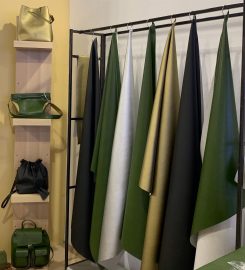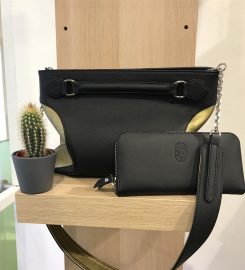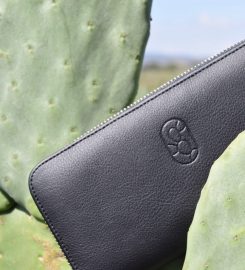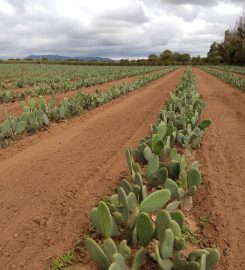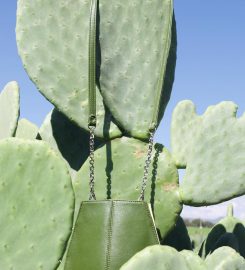Desserto
Vegan leather from Cactus
Vegan Leather from Cactus
VEGAN CACTUS ALTERNATIVE TO LEATHER FROM MEXICO FOUNDED IN 2019: NEW FAVORITE FOR LUXURY

With the purpose of creating an alternative to animal leather, Adrián López Velarde and Marte Cázarez, both hailing from Mexico, developed a vegan alternative to leather made with nopal (a cactus), which they successfully showcased last October 2019 in Milan, Italy.
After two years of research and development, the creators could finally finish marketable cactus based material as an alternative to leather in July 2019. Its trade name is Desserto® , and it has competitive features compared to animal or synthetic leather, like sustainability, performance and aesthetics.
Adrian and Marte had the idea after working in the furniture, automotive and fashion industries where they identified that the problem of environmental pollution was very serious. As a result, they were genuinely interested in reducing environmental impact, so they decided to leave their jobs and start Adriano Di Marti, a company to focus on developing Desserto®, which nowadays is known as cactus or nopal vegan leather.
MISSION & VISION
Desserto® is a highly sustainable plant based material as an alternative to leather made from cactus, often distinguished by its great softness at touch while offering a great performance for a wide variety of applications and complying with the most rigorous quality and environmental standards. The aim is to offer cruelty free, sustainable alternatives, without any toxic chemicals, phthalates and PVC. The result, Desserto® , the cactus material, is partially biodegradable and has the technical specifications required by the fashion, leather goods, luxury packaging and furniture industries.
RESPONSIBLE DEVELOPMENT
Deserttex® an automotive exclusive material which aim is to provide premium brands a highly sustainable cactus-based material which performs to the standards of the industry.
Deserttex® is often distinguished by its great softness at touch, not only does it handle really well but the level of break in the material is excellent, the substance is correct and it also has a degree of roundness and spring which you would normally only find in leather where the collagen acts in this way.
What is desserto® ?
The world’s first highly sustainable and environmentally friendly organic material made of Nopal cactus, also known as the prickly pear.
Produced in a large variety of colors, thicknesses and textures. Desserto® can exceed the demands of an ever-evolving industry.
GREAT HAND-FEEL AND PERFORMANCE
We consider our environmental footprint at every point of our production process, that is why Desserto® created a material that meets all environmental and performance standards, allowing designers to create beautiful accessories with elegant, long-lasting materials, that are reshaping fashion, and achieving a new level of responsible luxury.
Thanks to its strong molecular bonding in which cactus plays an important role, Desserto® offers high resistance to abrasion, rubbing, tearing, tensile and a great durability. This organic, sustainable material is a great alternative to animal leather and other synthetic materials that are not environmentally friendly.
Although animal leather is very resistant it is permeable and can even rot or crack if not dried quickly after it gets wet. Desserto® has competitive features handling humidity and liquids very well, it’s fully customizable and breathable.
All Desserto® materials are sold by linear meters, our standard width is 1.4 meters. The items described above are Desserto® line articles. For color, texture and thickness customization, pricing and general information please contact our staff at CONTACT
INNOVATION DEVELOPED IN A RESPONSIBLE WAY
Here in México, in the state of Zacatecas, we have a ranch where we grow our raw material: cactus. At the ranch we select and cut only the mature leaves of the plant without damaging the cactus itself, so every 6-8 months we will a new harvest. Also, we do not use an irrigation system for the cactus, it grows with rain water and the earth minerals which are rich in Zacatecas and great for the variety of cactus that we plant. The selected cactus is very resilient and strong, it can handle low temperatures during winter without dying and its thorns are very small so it’s easier and safer for our agriculture team to harvest.
The cactus plantation is perennial, meaning that we only plant one time and the plantation last for about 8 years, different from other C3 plantations such as corn which has to be cultivated, harvested and then cultivated again annually. The cactus species we cultivate is native and typical of the region, it is a CAM (Crassulacean Acid Metabolism) plant, it’s metabolism protects water and it doesn’t operate during daytime generating chlorophyll as most plants do.
Cactus absorbs CO2 during night because only when the environment is fresh the plant opens it’s stoma capturing CO2, generating oxygen and absorbing water present in the atmosphere which normally comes from the morning dew. C3 plants have a chlorophyll metabolism, these C3 plants need on average 1,000 liters of water to produce 1 kilogram of dry matter/material while cactus (CAM) only needs 200 liters, however these 200 liters are absorbed by the plant itself through its natural hygroscopic mechanism.
At the farm, we haven’t cut down any trees, opposite to that, as we plant a native cactus from the region the plantations match biodiversity and blends with wild flora. Being our plantation fully organic there is no harm to the biodiversity, also, our natural techniques stimulate the micro-flora and micro-fauna in the ground which is maintained without damage and wild fauna like hawks find a favorable environment with aliment.
Within the ranch, after cutting the mature leaves, we dry them under the sun for three days until achieving the exact humidity levels that we seek. So, there’s no additional energy used in this drying process. Then we process the organic raw material to make it part of our patented formula which allows us to make Desserto®. Please note that the ranch is fully organic, so there are no herbicides nor pesticides used. All the remaining organic cactus material not used in our process is exported and sold nationally in the food industry.
The top 10 sustainable facts of Desserto® organic cactus feed-stock:
1. Biodiversity amelioration in the region.
2. Reverts Land Use Change (LUC).
3. Enrichment of soil micro-flora and micro-fauna through native and typical organic cactus afforestation.
4. Huge savings in water as no irrigation is applied.
5. Environmental preservation as no chemicals are used like herbicides or pesticides.
6. Cactus is left unharmed to enable repeated harvesting from the same plant.
7. Energy savings by drying the feed-stock in a solarium.
8. No cross-industry conflict as the byproduct is directed to the food industry in an increased value form which is more attractive, and stimulates the agricultural sector to plant more cactus.
9. Full vision and traceability of the farm to ensure sustainable social practices.
10. Technological enhancements at the fields.
Cactus CO2 sequestering capacity:
Cactus is a natural carbon sink, it has a great CO2 sequestering capacity. From our 14 acres, we are able to absorb 8,100 tons of CO2/year while at the farm we only generate 15.30 tons of CO2 annually.
WHY plant-based material
By now all of us know that ”The Amazon is the Lungs of the Earth”. It means that the Amazon is home to 200 million cattle – not Logging but cattle. Cattle ranching is the largest driver of Amazon deforestation. 450,000 sq.km. of Brazil rain forest now is pasture, for comparison, Germany is 350,000 sq.km. UK is 240,000 sq.km. It is often said that a piece of a hamburger is a piece of the Amazon. 20% of the Amazon has been destroyed. An area the size of the UK is lost every year, although sometimes are much higher.
72 billion animals are slaughtered every year
1/3 of a million tons of fish are caught each year for cattle feed. 1/3 of all crop land is required for animal feed. By 2025 the demand for meat will rise by 33% to 40% estimated. Leather production – it is argued that the skin is a by-product of the meat industry. They argued that environmentally, the tanning industry is simply converting a product that would -otherwise go to landfill. From an environmental view (not Vegan) this argument is valid were is not for the tremendous environmental harm the tanning industry causes worldwide.
Chromium-tanned leather is the most popular form of producing leather these days, and one of the most noxious. It relies on a toxic slush of Chromium salts and tanning liquor.
ORGANIC CACTUS & CO2 SEQUESTERING CAPACITY
- Cactus is a natural carbon sink, it has a great CO2 sequestering capacity.
- From our 14 acres, we are able to absorb 8,100 tons of CO2/year while at the farm we only generate 15.30 tons of CO2 annually.
- It takes approximately 3 leaves of cactus to create one linear meter of Desserto.
- We only cut the mature leaves of the plant without damaging the plant itself, enabling repeat harvest every 6-8 months from the same plants.
- Our USDA certified cactus is grown in an organic farming system in the fertile and mineral-rich region of Zacatecas, Mexico.
- We do not compete with food, we are giving cactus its highest value!
- 50% of our processed harvest is directed to the food industry benefiting the farm. Two industries can co-exist with a single crop (feed-stock).
- Cactus naturally regenerates soil.
- It only takes 200 liters to grow one kilogram of cactus biomass which water is absorbed by the plant itself from humidity present in the atmosphere, compared to 1000 liters (on average) to grow the same kilogram from other crops.
- Cactus is a tough and resilient specie, adapted to extreme conditions able to survive in areas where nothing else will grow.
- Cacti can grow in severely degraded soils, which are inadequate for other crops.


